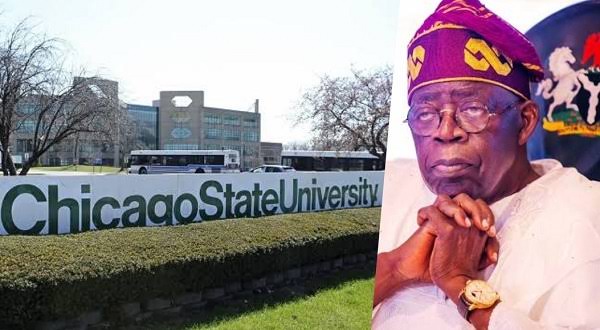
President Bola Tinubu has filed a detailed objection to a US court order requiring Chicago State University to release his academic records to his main challenger and the candidate of the Peoples Democratic Party in the February 25 presidential election, Atiku Abubakar.
Tinubu’s lawyers argued that his academic records are irrelevant in Nigerian courts, as “the Nigerian election proceedings and the Nigerian courts have explicitly been unreceptive to the discovery.” They also argued that Atiku’s request is “unduly intrusive” and that the court should set aside the previous order, saying his political opponents have previously used his illegally obtained academic records to attack him.
“That conclusion should be rejected because the discovery cannot be ‘for use’ in the foreign proceeding due to the decision of the Nigerian Election Court, and that decision shows the Nigerian courts would not be receptive to the discovery sought by the application.
“The Magistrate gave no weight to the decision of the Nigerian Election Court, which is authoritative proof of the unreceptivity of the foreign court to the discovery sought,” the objection read in part.
Atiku had filed an application in a US district court on August 2, 2023, requesting access to Tinubu’s academic records from Chicago State University. Atiku argued that a “second Chicago State University diploma has since emerged (dated June 27, 1979) that bears the name ‘Bola Ahmed Tinubu’ but also presents with a different font, punctuation, seal, and signatures than the June 22, 1979 diploma, among other alleged discrepancies.” Atiku told the US that he wanted to authenticate these documents to determine whether a “Chicago State University diploma in the name of Bola Ahmed Tinubu dated June 22, 1979, that was submitted to the INEC before the Nigerian presidential election in February 2023 is genuine or was forged.”
Magistrate Judge Jeffrey Gilbert ordered the university to release the requested documents to Atiku within two days on September 19. Tinubu’s legal team then approached a district judge of the court to suspend the order to enable them to file a more elaborate challenge against it.
At an emergency hearing on September 21, the district judge, Nancy Maldonado, agreed to delay the order compelling Chicago State University to release Tinubu’s academic documents. Following the approval, Tinubu’s legal team filed their objection on Monday.
In the objection, Tinubu’s lawyers argued that the magistrate judge granted Atiku’s application even though the applicant was barred from attempting to use the discovery in the foreign proceeding. They also argued that while Atiku’s case at the Nigerian court only touched on “a CSU diploma”, the magistrate judge “erroneously concluded” to issue an order for the release of “other educational documents.”
Tinubu argued that he stood to suffer harm in allowing discovery on issues and documents outside the diploma because his records “were illegally obtained previously and have been utilised to attack him”.
“The unlawful release of documents previously allowed Intervenor’s opponents to sow confusion and spread conspiracy theories,” Tinubu’s objection read in part.
Tinubu’s lawyer characterised Atiku’s application as mere “opposition research on a political opponent.”
